The Evacuees
The Making of the BBC TV drama
By Alan Parker
The Evacuees came about by a number of coincidences. Sometime in 1972, I had a call from my friend David Puttnam, who was in the middle of producing That’ll be the Day, starring David Essex and Ringo Starr.
“Alan, Claude is sick, can you come down and shoot a few scenes? It’s just for a day. He’ll be back tomorrow.”
Claude was the director, Claude Whatham, quite famous at the time for his BAFTA winning BBC film of Laurie Lee’s Cider with Rosie and Puttnam was anxious not to lose a day’s filming — and probably was claiming on the insurance anyway (although I have no proof of this).
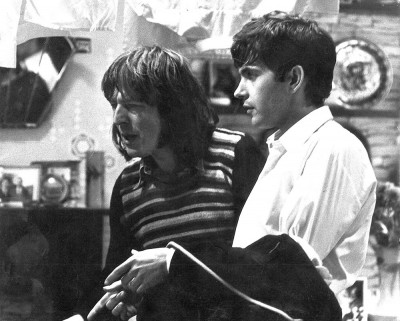
Alan Parker directing David Essex on set of ‘That’ll be the Day’.
(That’ll be the day I stood in for Claude Whatham.)
As I had been directing commercials for a little while, I was reasonably comfortable to be on the set, especially as it was at my favourite studio, Lee Electric — a shabby, converted biscuit factory in Kensal Rise.
After introducing myself to the crew (some of whom I knew) the first scene I directed was David Essex and a young actress making love in the back of a van. They both explained to me that the previous director had agreed that they wouldn’t have to take off their clothes and so I filmed the van in wide shot being jiggled up and down by the crew as the windows steamed up, and the actress whimpered for her lunch. I then spent the next two days mostly shooting stuff that Puttnam wanted and that Claude had probably refused to do. Most of my stuff made it to the finished cut, but it was an insignificant contribution to the film. Or as Claude so succinctly summed it up at the premiere:
Claude (to Alan) : Thanks for all your help
Alan (taken by surprise) : Oh, it was nothing.
Claude: Yes, you’re right.
When Ray Connolly wrote the sequel, Stardust, they offered it to me to direct. However, I declined, probably not wanting to do a sequel, but also wisely realizing that I was probably not ready to shoot a feature film.
After my first years shooting TV commercials I had made a short film (52mins) called No Hard Feelings. The prevailing systems of the time, whereby TV companies rarely welcomed independent TV production— almost everything being done in-house at the impenetrable television corporations of the BBC and ITV — made it very difficult to get our film bought and shown. My Producer, Alan Marshall and myself had rather ingenuously leapt into the void making the film with our own money, confident that it would be, (as indeed we thought it was), better than anything else we saw on TV. The reality of the protective and insular TV world was that it was impossible even to get it viewed and considered, let alone bought.
After months of banging our heads against this unyielding wall, a publicist friend of ours, Allen Burry, introduced Alan Marshall and I to Mark Shivas. Mark was a senior figure in the BBC TV drama department and a highly respected and prolific producer: the Six Wives of Henry VIII being his most recent success at the time. He had a World War II script of his own called The Evacuees written by Jack Rosenthal. The script had been in turnaround from Granada where Jack was a regular contributor, starting as he did on Coronation Street and creating popular TV series like The Dustbinmen and The Lovers.
At Granada, The Evacuees script was originally a project of director, Michael Apted who had instead chosen to direct the Ray Connolly script of Stardust for Puttnam, after I had declined — so there was a curious serendipity to it all.
At first, I was reluctant to do The Evacuees becauseI had written my own story of evacuated children in the war called ‘Puddles in the Lane’, as part of our Blitz trilogy and also, working for the BBC, with its strict, union imposed, “in-house” policy, meant that I would not have the security blanket of my usual crews and, importantly, my producer, Alan Marshall.
The BBC had a strict roster system, imposed by the unions, whereby crews —all permanently on staff— got each job as it came up, irrespective of whether it was a ‘Dr Who’ episode or a prestigious ‘Play for Today’. I had asked Mark Shivas if he could finagle the services of Brian Tufano, the star cinematographer at the Beeb, having worked with Alan Clarke, Ken Loach and Jack Gold: directors I very much admired. Shivas was a dab hand at manipulating the BBC’s internecine, internal politics and managed to secure Tufano for the film. To be accurate, we were never allowed to call it a film. It was deemed to be a television drama, for release as the Christmas special on BBC 2. I was instructed that it just so happened to be shot on film, but was never to be referred to as anything but a drama. A film opened up a whole can of union beans.
The film…er, drama…was set in the north west and involved the evacuation of school children from central Manchester to the comparative safety of quiet seaside towns along the coast.
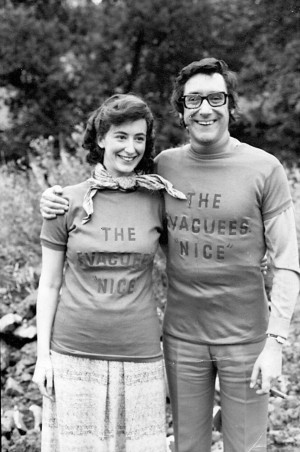
Maureen Lipman and Jack Rosenthal. Nice.
The Jewish school that Jack had written about had been omitted from the Manchester schools’ list of wartime preparations and so they were the last to be shipped off, in some confusion, with no pre-arranged place to stay. Hence the moment they arrived in Lytham they were marched from house to house to find a welcoming surrogate mother for these odd Jewish misfits. Our story was centred on the brothers: Danny and Neville Miller.
The best person to play the boys’ mother was the actress Maureen Lipman. The only snag was that she had just given birth to her daughter, Amy and she was also Mrs Rosenthal, the writer’s wife. But she understood the part more than any other actress and also read it best.
We found our locations in Manchester, Salford, Blackpool and Lytham St Annes and cast mainly in and around the Manchester schools. I found Steven Serember (young Neville) at the King David High School. He was waiting outside the headmaster’s office when we spotted him — always a good sign when casting
As we started shooting in Salford, it was obvious that the boy playing Sidney Zuckerman was awkward in front of camera and I promptly swapped him for a periphery actor, Paul Besterman, who’s precociousness had endeared him to us all and he fitted the part perfectly. As Maureen said, “He looks like he’s been eating nothing but gefilte fish all his life.”
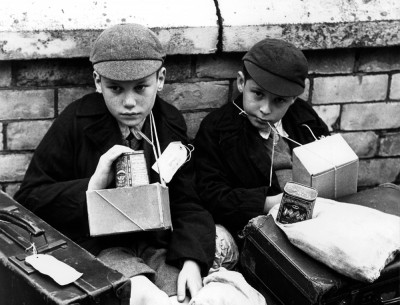
Steven Serember (Neville) and Gary Carp (Danny), Lytham St Annes
It was an awkward period as I became accustomed to the ways in which the BBC crew functioned and they got used to how I worked. Tufano, in particular, was not easy. He was very much in charge of his world and very good he was too. There were no half-answers for him, you had to be precise with your instructions otherwise he did it his way, which we mostly did anyway. He was a hard taskmaster and pushed me considerably, as he did all of his directors. (In future years Tufano would photograph the first films of Danny Boyle and Stephen Daldry and no doubt gave them both stick too.) With a tight, six-week schedule, we had to shoot fast, often with available light and I was forever pushing the process to be more cinematic and Tufano, forever finessing my instructions with the limitations (and freedom) of the 16mm film camera. Tufano graduated at the BBC from documentary to film drama and cut his teeth in black and white film, as had I with my commercials. We had a similar taste for single source, dramatic light: a sensibility where shadows become as important as the lit areas. (Not that we had much choice as we didn’t have many lights anyway.) The then current tastes, and BBC diktats, were to over-light everything, especially in colour. Personally, I had always disliked lighting everything as if it was a supermarket — even if it was a supermarket. Our work opposed that trend and harkened back to more expressionistic lighting of the thirties and forties.
Jack Rosenthal was not there all the time, but visited the set often, to see his wife of course, but also to keep an eye on me. Maureen was doing that anyway. If ever I improvised on her lines, she would politely guide me back to what Jack had originally written. But having Jack around was good for morale and the very essence of how a writer should behave on a film set. He rarely interfered; his congenial personality cheered up the often rain soaked crew; he didn’t bump into the dolly; he kept out of the way of the electricians and he kept a subtle sideways eye on all of us to make sure we didn’t bugger up his script.
Mark Shivas was an ever-supportive producer at every stage. Although, to be honest, he wasn’t there much, as the wind and rain of Salford was less attractive to him than his comfortable chair at Television Centre where he had many other projects on the go. One day a taxi arrived right in the middle of the shot and out stepped Mark. “Who’s that twat?” said the camera assistant. “It’s the producer.” I replied.
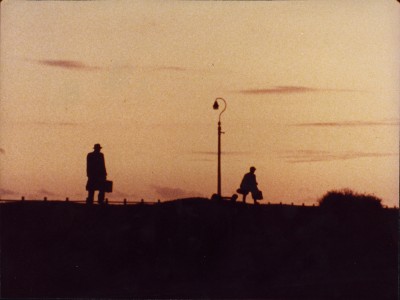
Mr Goldstone (Ian East) and Sidney Zuckerman (Paul Besterman) walk into the sunset, Lytham St Annes
Mark’s surrogate on location, Graham Benson, was a great collaborator and we all owed a great deal to him for the smooth running of the production because the pace of filming was quite arduous. I had been used to the more leisurely pace of TV commercials grabbing 30 seconds of film a day, but the whole of The Evacuees, a 75 minute film, had to be shot in thirty days. We were forever improvising our camera shots to push things beyond a normal BBC drama production and to add cinematic width to Jack’s TV script. On one shot I wanted to get the schoolteacher and the lonely Zuckerman trudging along the seafront, silhouetted against the falling sunlight. Tufano and I, ignoring the rest of the crew, roared off in the camera station-wagon and grabbed the shot with the camera cradled in Tufano’s arms, whilst I yelled at the puzzled passers by walking their dogs, screaming at them to to duck down out of our shot in the precious seconds before the sun dipped below the horizon.
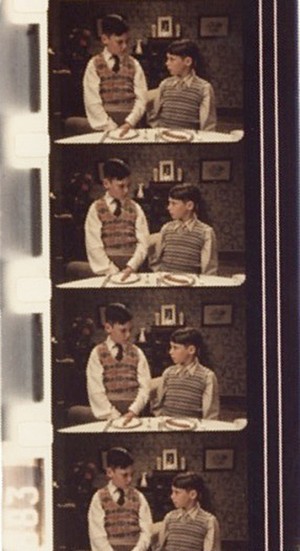
The Miller brothers eat their first pork sausage
Directing the mainly Jewish cast, as a non-Jew, had its interesting moments for me. There is a scene where the two evacuated boys had to eat a pork sausage for the first time in their lives. I had asked their Rabbi if we could have special dispensation for the film. This was refused, so I unkindly told the boys that we were going to use good old-fashioned pork from the local butcher. The authentic reactions on the two boys’ faces on film are a testament to their revulsion at eating pork. At the end of the shot the younger boy, Gary, went out into the street and threw up on the cobbles. I went out to comfort him. I put my arms around him and said, “Don’t worry, they weren’t pork, they were kosher sausages.” He suddenly stopped throwing up and said, “I thought they tasted OK.”
When we finished filming and put a cut together, the final sound mix was not liked by the BBC head of drama. He didn’t like my use of music— the BBC was very purist at the time — and the use of music on the soundtrack was frowned upon as being rather vulgar and too manipulative. He said, it was after all a drama not a film.
Afterwards
The film went on to win a BAFTA for best TV drama and also an Emmy for best International Drama. I persuaded Brian Tufano to leave the BBC and he went on to do great work in feature films, including Trainspotting and Billy Elliot among many others. He is presently the head of the Cinematography department at the National Film and Television School. Jack Rosenthal (died 2004) went on to win two more BAFTA’s with Bar Mitzvah Boy and Spend, Spend, Spend. He also wrote Yentl with Barbra Streisand. Mark Shivas (died 2008) went on to produce dozens of TV plays and films — most famously his work with Anthony Minghella and Alan Bennett. Maureen Lipman went on to an illustrious acting career becoming a national treasure along the way.
All text and photos © Alan Parker